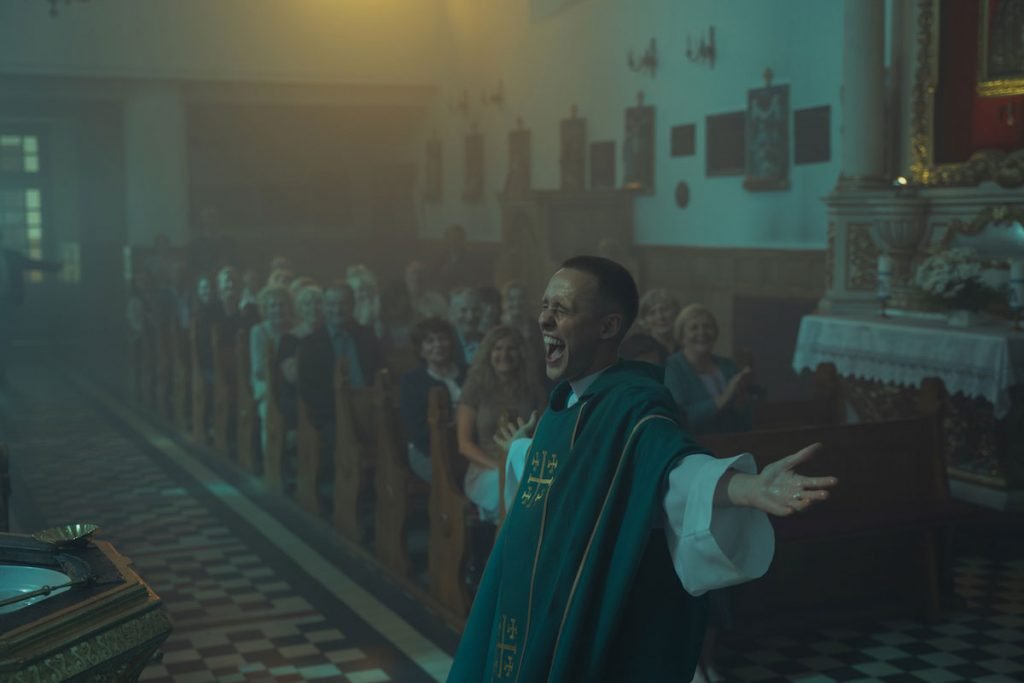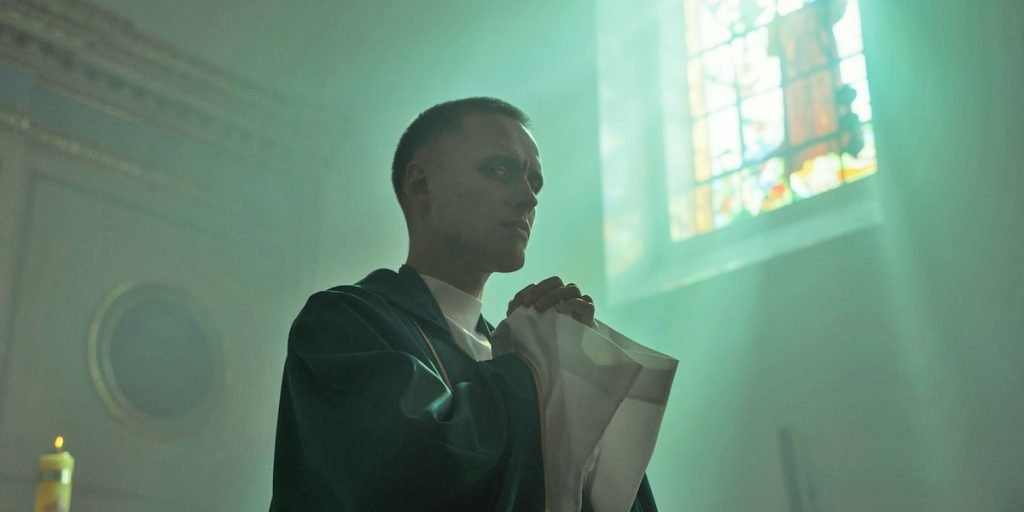Best International Film Oscar nominee Corpus Christi sagely depicts Polish societal tensions through the lens of a young parolee impersonating a rural priest.
Corpus Christi’s director is 38 and its writer is 27. I don’t think the average American viewer, even one seeking out foreign films, has sufficient knowledge of recent Polish history to understand the sort of experience these two have had. Collectively, they have experienced the fall of the USSR and the related economic and cultural shocks. They’ve seen their currency eviscerated by efforts to quickly westernize in the early 90s. I distinctly remember going to Poland with my father when I was 10 years old in 1995. One million of the local currency (zloty) was equal to about $25. I still have an old 1,000,000 zloty bill kept as a souvenir. Perhaps the two nicest things I own are the two chess sets we brought home from Poland – one hand carved of wood ($12 in US terms at the time), one molded metal covered in gold and silver with a beautiful wooden board ($80 in US terms).
One can, of course, imagine the sort of chaos this sort of economic upheaval would bring upon a nation that still hadn’t closed the gaping wounds of World War II some 40 years earlier. They saw Polish leadership functionally tank the economy for 95% of the population in an effort to meet the debt criteria required for EU admission. They’ve felt the cultural strain of immigration from the Middle East as acutely as any European country. Generally, the country is exceeding Catholic. John Paul II’s Polish lineage saw to a great embrace of the faith in the country. Deep ties to religion combined with vast economic hardship and total failures of a social safety net historically lead to certain culturally shifts in a country. There’s a reason why Donald Trump received a hero’s welcome in Poland.
In spite of, or perhaps because of, this crucible, Polish cinema has grown immensely in quality. Paweł Pawlikowski has deservedly received international acclaim for his masterworks Cold War and Ida. While he’s not at that level yet, Jan Komasa (Warsaw ’44) has the feel of someone who might get there. Working from a brilliantly textured script by Mateusz Pacewicz, Komasa finds soul in what could otherwise have been a soapy story. Here we see a young man – deeply flawed – stumble into impersonating a priest upon his release from prison. His faith is genuine, so too his devotion to his growing congregation. His vices – booze, women, drugs – remain a constant background din.

It’s fascinating to see how these two bounce the tensions of Polish culture off of this character. They clearly see both genuine value in spiritual healing, but harbor deep cynicism about the apparatus that delivers it. They need not mention pedophilia and shifting demography for it to resonate in the film. The congregation our lead inherits is elderly and spiritually broken by a drunk driving incident that took the lives of many town youth.
Loosely based on real instances of fake priests in Poland, the film is viewed through the lens of a Polish youth, recently released from prison, as he attempts to ingratiate himself into a community while pretending to be a priest. “Father Tomasz”, aka Daniel, is played brilliantly by Bartosz Bielenia (The High Frontier). Every critic who has written about this movie has noted Bielenia’s piercing blue eyes. They’re uncanny. His eyes are so expressive, and the viewers eyes so drawn to them, that it elevates even the films weaker moments. He prowls through scenes like a young Cillian Murphy with tremendous charisma. It’s a difficult, smart performance and one of the best of the year.
It is, alas, impossible not to mention the film’s flaws. It can’t seem to help itself but to fall into melodrama. The film feels the need to impose a love story between our Father Thomaz and a local girl which is elevated by the actors but remains little more than a distraction from the more interesting core drama. Like all “rise and fall” narratives, Corpus Christi must have a tragic reveal of our protagonist’s deceit. Here the execution is frustratingly contrived, and it cannot help but leave the film with a bit of a sour aftertaste. Nevertheless, flawed plots can still house revelatory characters.
Corpus Christi is brilliantly made, beautifully acted, well written, and a fantastic reflection of the tensions in Polish culture today. A worthy best international film nominee at last year’s Oscars.
Corpus Christi received its US release concurrent with the spread of COVID-19. Accordingly, the film’s distributor teamed up with various theaters and Film Movement Plus to release the movie digitally so audiences would have a chance to see the film.

